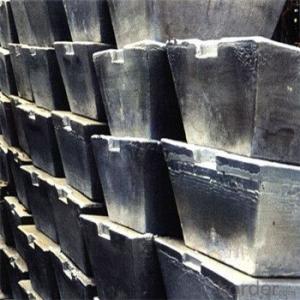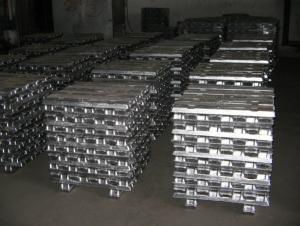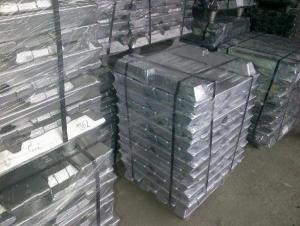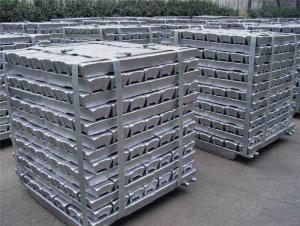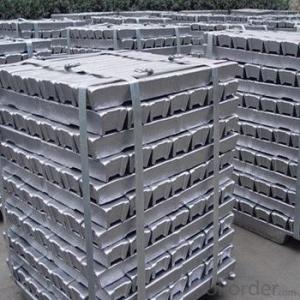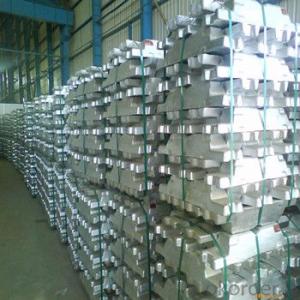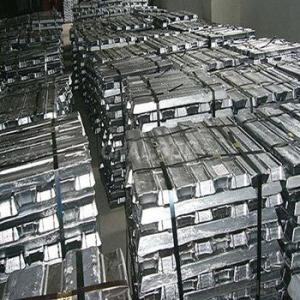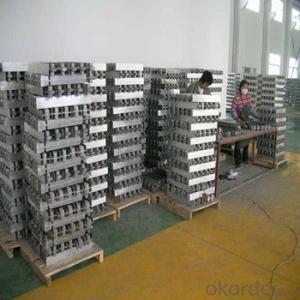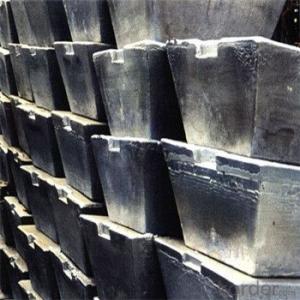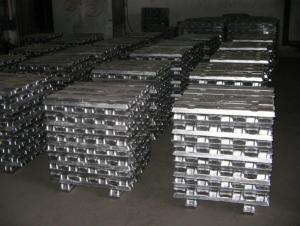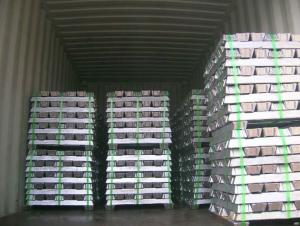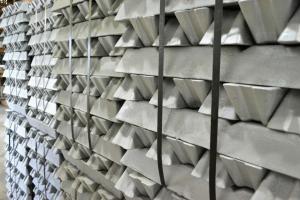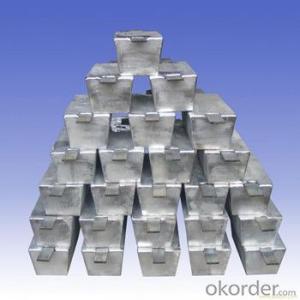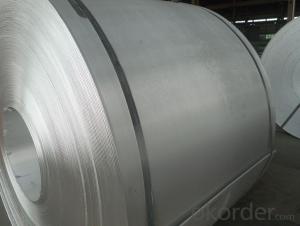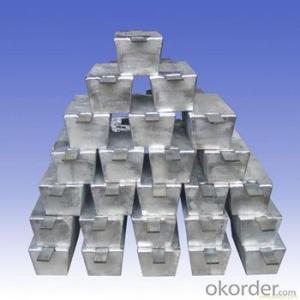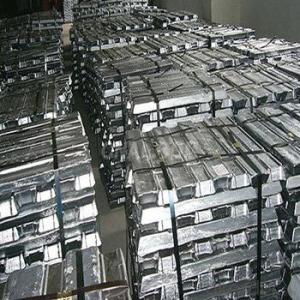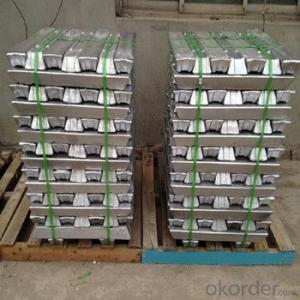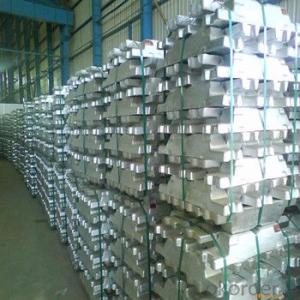Aluminium Ingot from Factory Wholesales Made in China
- Loading Port:
- China main port
- Payment Terms:
- TT OR LC
- Min Order Qty:
- 1000 m.t.
- Supply Capability:
- 10000 m.t./month
OKorder Service Pledge
OKorder Financial Service
You Might Also Like
Pure Aluminum Ingot Used for Industry
1.Structure of Aluminum Ingot Description
Aluminum Ingot is with the AL as the main chemical composition. Aluminum Ingot is used for industry,such as automobile,pinning and weaving,electron broadly and so on. Aluminum Ingot has the following advantages: easy control and operation, fast melting.
2.Main Features of the Aluminum Ingot
•High Purity
•Easy control and operation
•High strength
•Fast melting
•Competitive price
•Best Service
3. Aluminum Ingot Images
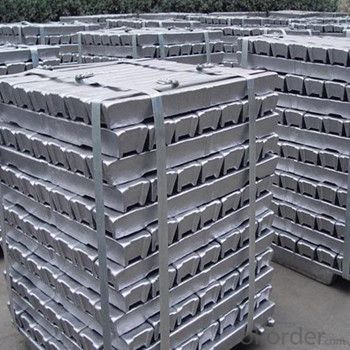
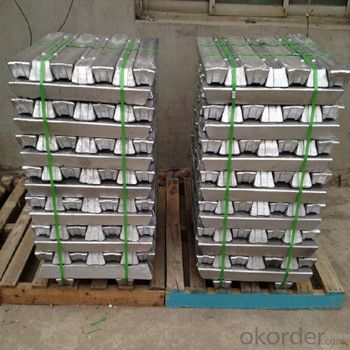
4. Aluminum Ingot Specification
Grade | Chemical Composition % | |||||||||
Al≥ | impurities ≤ | |||||||||
Si | Fe | Cu | Ga | Mg | Zn | Mn | others | Sum | ||
Al99.9 | 99.90 | 0.50 | 0.07 | 0.005 | 0.02 | 0.01 | 0.025 | - | 0.010 | 0.10 |
Al99.85 | 99.85 | 0.80 | 0.12 | 0.005 | 0.03 | 0.02 | 0.030 | - | 0.015 | 0.15 |
Al99.7 | 99.70 | 0.10 | 0.20 | 0.010 | 0.03 | 0.02 | 0.030 | - | 0.030 | 0.30 |
Al99.6 | 99.60 | 0.16 | 0.25 | 0.010 | 0.03 | 0.03 | 0.030 | - | 0.030 | 0.40 |
Al99.5 | 99.50 | 0.22 | 0.30 | 0.020 | 0.03 | 0.05 | 0.050 | - | 0.030 | 0.50 |
Al99.00 | 99.00 | 0.42 | 0.50 | 0.020 | 0.03 | 0.05 | 0.050 | - | 0.050 | 1.00 |
5.FAQ of Aluminum Ingot
We have organized several common questions for our clients,may help you sincerely:
①How about your company?
A world class manufacturer & supplier of castings forging in carbon steel and alloy steel,is one of the large-scale professional investment casting production bases in China,consisting of both casting foundry forging and machining factory. Annually more than 8000 tons Precision casting and forging parts are exported to markets in Europe,America and Japan. OEM casting and forging service available according to customer’s requirements.
②How to guarantee the quality of the products?
We have established the international advanced quality management system,every link from raw material to final product we have strict quality test;We resolutely put an end to unqualified products flowing into the market. At the same time, we will provide necessary follow-up service assurance.
③How long can we receive the product after purchase?
In the purchase of product within three working days, We will arrange the factory delivery as soon as possible. The pecific time of receiving is related to the state and position of customers.Commonly 7 to 10 working days can be served.
- Q:What are the different shapes and sizes of aluminum ingots?
- Aluminum ingots come in various shapes and sizes depending on the specific requirements of the industry they are being used in. The most common shape of aluminum ingots is rectangular, with a length ranging from a few inches to several feet, and a width and height that vary proportionately. These rectangular ingots are typically used in industries such as construction, automotive, and aerospace. In addition to rectangular ingots, there are also cylindrical-shaped aluminum ingots. These ingots have a circular cross-section and can have varying diameters and lengths. Cylindrical ingots are commonly used in the manufacturing of electrical components, such as wires and cables, due to their uniform shape and ease of processing. Moreover, aluminum ingots can also be found in other shapes such as trapezoidal or triangular, although these are less common and are usually customized to meet specific industrial requirements. These irregular-shaped ingots are often used in specialized applications where unique designs or specific mechanical properties are needed. The sizes of aluminum ingots can vary widely as well. Smaller ingots are typically used for smaller-scale applications or for testing purposes, whereas larger ingots are used in heavy industries where large quantities of aluminum are required. The weight of an aluminum ingot can range from a few pounds to several tons, depending on its size and intended use. Overall, the shapes and sizes of aluminum ingots are diverse and can be tailored to meet the specific needs of different industries and applications.
- Q:How are aluminum ingots used in the production of heat exchangers?
- Aluminum ingots are used in the production of heat exchangers as they provide the raw material for manufacturing the heat transfer plates and tubes. These ingots are melted, cast, and then further processed to create the necessary components of the heat exchanger. The lightweight and high thermal conductivity properties of aluminum make it an ideal material choice for efficient heat transfer in these devices.
- Q:How are aluminum ingots used in the production of bicycles?
- Aluminum ingots play a crucial role in the production of bicycles as they are the primary material used to manufacture bicycle frames. Aluminum is a lightweight and durable metal, making it ideal for creating strong yet lightweight frames. To produce bicycle frames, aluminum ingots are first melted down and then poured into molds to form the desired shape. The molten aluminum is allowed to cool and solidify, resulting in a solid ingot in the shape of the frame. These aluminum ingots are then further processed through various techniques such as extrusion or hydroforming to shape them into tubes or other desired forms. The tubes are cut, welded, and joined together to create the frame structure of the bicycle. Aluminum ingots are preferred in bicycle manufacturing due to their exceptional strength-to-weight ratio. This allows for a lighter bicycle that is easy to handle and maneuver, while still providing the necessary strength and rigidity for support. Additionally, aluminum ingots offer excellent corrosion resistance, ensuring that the bicycle frames can withstand harsh weather conditions and last for a longer period. This feature is especially important for bicycles as they are often exposed to outdoor elements. Furthermore, aluminum ingots enable manufacturers to create frames with intricate designs and shapes, providing opportunities for customization and innovation in bicycle design. In summary, aluminum ingots are integral to the production of bicycles as they are used to create lightweight, durable, and corrosion-resistant frames. Their versatility and strength make them a preferred choice for manufacturers, contributing to the overall quality and performance of bicycles.
- Q:What are the safety precautions when handling aluminum ingots?
- Some safety precautions when handling aluminum ingots include wearing appropriate personal protective equipment such as gloves, safety glasses, and a face shield to protect against potential hazards. It is also important to handle the ingots with care to prevent injury from sharp edges or falling objects. In addition, proper lifting techniques should be used to avoid strain or back injuries. Fire safety measures should be implemented, as aluminum can react with water or air at high temperatures. Overall, following proper handling procedures and being aware of potential risks can help ensure the safety of individuals working with aluminum ingots.
- Q:How are aluminum ingots used in the production of electronic devices?
- Aluminum ingots are used in the production of electronic devices in several ways. Firstly, aluminum is a lightweight and durable metal, making it an ideal choice for manufacturing electronic device casings or housings. These ingots are melted and cast into specific shapes to form the outer shells of devices such as smartphones, laptops, tablets, and even gaming consoles. Additionally, aluminum is an excellent conductor of electricity and heat. It is often used as a heat sink material in electronic devices to dissipate excess heat generated during operation. The ingots are processed into heat sinks, which are then integrated into various components like processors, graphics cards, and power modules. The high thermal conductivity of aluminum helps in maintaining optimal operating temperatures and prevents overheating, ensuring the longevity and performance of electronic devices. Moreover, aluminum ingots are also utilized in the production of printed circuit boards (PCBs). PCBs are the backbone of electronic devices, providing a platform for assembling and connecting various electronic components. Aluminum is used as a base material for manufacturing PCBs, providing good mechanical strength and electrical insulation. The ingots are processed into thin sheets that serve as the base substrate for mounting electronic components, creating a solid foundation for the device's functionality. In summary, aluminum ingots play a crucial role in the production of electronic devices. They are used to create lightweight and durable casings, heat sinks for thermal management, and base materials for PCBs. With its excellent electrical conductivity, heat dissipation capabilities, and mechanical strength, aluminum contributes to the overall performance, reliability, and efficiency of electronic devices.
- Q:Want to know the difference between ZL101 and A356 aluminium ingots?
- Like aluminum alloy die-casting material, usually ADC12, of which ADC12 is Japan's aluminum alloy brand. Aluminum Alloy grades and are not as components in China, of course does not mean that there is no such Aluminum Alloy, die casting industry Aluminum Alloy actually ADC12 is representative of the brand, with a state of an industry related to the degree of technological development!
- Q:102 non-standard aluminum ingot is like? And ordinary non-standard aluminum ingot what is the difference?
- Ordinary non-standard aluminum ingot is the tube you use, regardless of your standard, with miscellaneous aluminum recovery smelting out of the aluminum ingot.
- Q:How are aluminum ingots used in the production of transportation vehicles?
- Aluminum ingots are used in the production of transportation vehicles as they are melted down and shaped into various components such as engine blocks, wheels, body panels, and chassis. The lightweight and durable nature of aluminum make it a preferred choice in the automotive industry, as it helps improve fuel efficiency, enhance performance, and reduce overall vehicle weight.
- Q:What are the different grades of aluminum ingots?
- Aluminum ingots come in various grades, each possessing distinct properties and applications. The commonly known grades comprise: 1. Pure Aluminum (99%+): This grade represents the elemental form of aluminum and possesses remarkable malleability, lightness, and resistance to corrosion. It finds extensive utilization in scenarios necessitating high electrical conductivity, such as electrical wiring and transmission lines. 2. Aluminum Alloys: These grades consist of aluminum blended with other elements like copper, magnesium, silicon, or zinc, to enhance specific characteristics. For instance, aluminum alloys containing copper are renowned for their exceptional strength and resistance to corrosion, rendering them ideal for structural components within the aerospace and automotive industries. 3. Cast Aluminum: This grade is produced through the casting process and is commonly employed in the production of engine parts, automotive wheels, and other demanding applications that prioritize strength and durability. 4. Wrought Aluminum: Wrought aluminum ingots experience a shaping process, such as rolling or extrusion, to create tailored forms like sheets, plates, or bars. This grade is frequently utilized in the construction sector for structural elements like beams, columns, and facade systems. 5. High-Strength Aluminum: These grades are engineered to possess superior strength while retaining good formability. They find extensive use in industries requiring lightweight, yet sturdy materials, such as aerospace, military, or sporting goods manufacturing. It's worth noting that these grades can be further categorized into specific alloys, each possessing unique characteristics and applications. The selection of an aluminum grade depends on the intended usage, desired properties, and manufacturing requirements of the final product.
- Q:Can aluminum ingots be used in the production of jewelry?
- Yes, aluminum ingots can be used in the production of jewelry. However, aluminum is not a commonly used material for jewelry due to its low melting point and softness. It is often used in costume jewelry or as a base metal for plating.
1. Manufacturer Overview |
|
|---|---|
| Location | |
| Year Established | |
| Annual Output Value | |
| Main Markets | |
| Company Certifications | |
2. Manufacturer Certificates |
|
|---|---|
| a) Certification Name | |
| Range | |
| Reference | |
| Validity Period | |
3. Manufacturer Capability |
|
|---|---|
| a)Trade Capacity | |
| Nearest Port | |
| Export Percentage | |
| No.of Employees in Trade Department | |
| Language Spoken: | |
| b)Factory Information | |
| Factory Size: | |
| No. of Production Lines | |
| Contract Manufacturing | |
| Product Price Range | |
Send your message to us
Aluminium Ingot from Factory Wholesales Made in China
- Loading Port:
- China main port
- Payment Terms:
- TT OR LC
- Min Order Qty:
- 1000 m.t.
- Supply Capability:
- 10000 m.t./month
OKorder Service Pledge
OKorder Financial Service
Similar products
New products
Hot products
